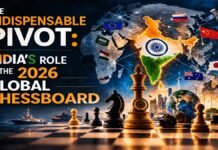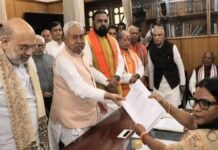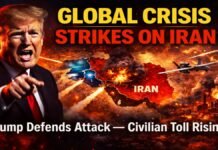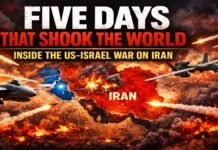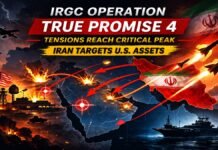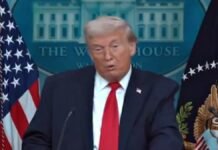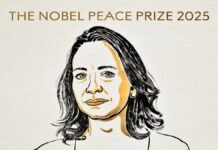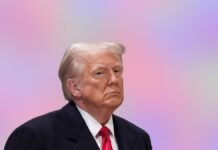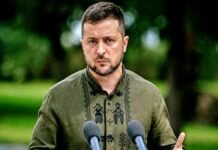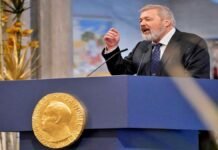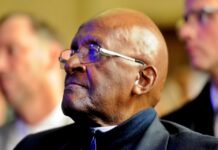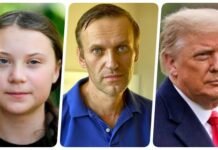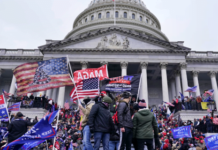
Key Points
- Maria Corina Machado wins 2025 Nobel Peace Prize for Venezuelan democracy advocacy
- Viral video captures Machado’s tearful, emotional reaction upon receiving Nobel notification call
- Kristian Berg Harpviken of Norwegian Nobel Institute personally informed her of the honor
- Machado describes achievement as “movement victory” for entire Venezuelan society, not individual triumph
- Edmundo Gonzalez Urrutia, who replaced banned Machado in elections, congratulates her
- Both leaders call the historic moment “shocking but inspiring”
- Nobel Committee Chairman Jørgen Vatne Friednes praises Machado as influential opposition unifier
- White House and Trump supporters express anger over president not receiving Nobel Peace Prize
- Communications Director Steven Cheung accuses Nobel Committee of prioritizing politics over peace
- Trump supporters cite claimed role in preventing eight wars and reducing global tensions
- Nobel Peace Prize uniquely awarded in Oslo, Norway while other Nobel categories announced in Stockholm
- Economics Nobel Prize scheduled for announcement next Monday
New Delhi: The Norwegian Nobel Committee’s announcement of the 2025 Nobel Peace Prize to Venezuelan opposition leader Maria Corina Machado has sparked powerful emotional reactions captured in viral social media footage while simultaneously igniting controversy in the United States over President Donald Trump’s exclusion from the prestigious honor.
Viral Moment: Machado’s Emotional Reaction
A deeply moving video documenting Maria Corina Machado’s initial reaction to learning about her Nobel Peace Prize win has rapidly spread across social media platforms, resonating with millions of viewers worldwide. The authentic footage captures the raw emotional impact of receiving one of the world’s most prestigious honors for her courageous fight for democracy in Venezuela.
Kristian Berg Harpviken, the distinguished director of the Norwegian Nobel Institute, personally placed the congratulatory phone call to Machado immediately following the official announcement. The video shows Machado’s face transforming from initial disbelief to overwhelming emotion as Harpviken shared the momentous news. Her eyes visibly welled with tears as the reality of the recognition began to sink in, creating an intimate moment that humanized the often formal Nobel Prize announcement process.
Remarkably, even Harpviken himself appeared visibly moved during the call, demonstrating the profound significance of this particular award. The mutual emotional connection between the Nobel Institute representative and the laureate underscored the exceptional nature of Machado’s struggle and the international community’s recognition of her sacrifices.
A Movement, Not Individual Victory
In her initial response, Machado demonstrated the humility and collective vision that has characterized her democratic advocacy throughout years of struggle against authoritarianism. Rather than claiming personal triumph, she immediately framed the Nobel Peace Prize as recognition for Venezuela’s entire pro-democracy movement.
“This is a movement, not a victory for me alone,” Machado emphasized, her voice filled with emotion and determination. This statement reflects her consistent leadership philosophy of building broad coalitions and empowering ordinary Venezuelans to reclaim their democratic rights rather than cultivating a personality-centered political movement.
Machado continued, expressing genuine amazement at being selected for such extraordinary recognition: “I am amazed that I was chosen for such a great honor.” Her words conveyed both gratitude and a sense of responsibility to the millions of Venezuelans who have suffered under authoritarian rule and economic collapse while yearning for democratic restoration.
This collective framing of her Nobel Prize resonates deeply with Venezuelan civil society organizations, opposition activists, and ordinary citizens who have endured persecution, economic hardship, and political repression while fighting for democratic principles. By emphasizing the movement rather than individual achievement, Machado reinforced the solidarity and shared struggle that defines Venezuela’s pro-democracy efforts.
Congratulations from Fellow Opposition Leader
The emotional significance of the moment intensified when Edmundo Gonzalez Urrutia, who assumed Machado’s political mantle after the Maduro government arbitrarily banned her from contesting elections last year, personally called to offer his heartfelt congratulations. This gesture demonstrated the unity and mutual respect characterizing Venezuela’s opposition leadership despite the challenging circumstances they navigate.
Both Machado and Gonzalez Urrutia described this historic Nobel Prize moment using identical language “shocking but inspiring” reflecting their shared understanding of the award’s profound implications for Venezuela’s democratic struggle. The recognition provides international validation of their peaceful resistance strategy and moral authority to their cause at a critical juncture in Venezuela’s political crisis.
Gonzalez Urrutia’s congratulatory call also highlighted the continuity of Venezuela’s opposition movement despite government attempts to suppress individual leaders. When Machado was banned from political participation, Gonzalez Urrutia stepped forward to carry the democratic torch, demonstrating the movement’s resilience and depth beyond any single personality.
Nobel Committee’s Recognition
Nobel Committee Chairman Jørgen Vatne Friednes issued a formal statement elaborating on the decision to honor Machado with the 2025 Peace Prize. He specifically praised her as “an influential opposition unifier who tirelessly fought for free elections and democratic rights,” emphasizing qualities that distinguish her leadership in Venezuela’s complex political landscape.
Friednes highlighted Machado’s consistent commitment to non-violent political activism despite facing severe persecution including political bans, threats, harassment, and potential imprisonment. Her willingness to continue fighting for democratic principles through peaceful means, even when confronted with violent government repression, exemplifies the courage and moral conviction the Nobel Peace Prize seeks to recognize.
The Committee’s citation also acknowledged Machado’s role in unifying Venezuela’s historically fractured opposition forces around common democratic goals. This achievement proved particularly challenging given the diverse ideological perspectives, personal rivalries, and strategic disagreements that have sometimes weakened opposition effectiveness. Machado’s ability to build consensus and maintain focus on fundamental democratic principles earned special recognition from the Nobel Committee.
Nobel Prize Geography and Upcoming Announcements
The Nobel Peace Prize maintains its unique distinction as the only Nobel Prize awarded in Oslo, Norway, reflecting the specific provisions of Alfred Nobel’s will and the historical role Norway played in the prize’s early years. This geographical distinction separates it from the other Nobel categories medicine, physics, chemistry, and literature which are announced and awarded in Stockholm, Sweden.
This separation creates distinct ceremonies and emphasizes the Peace Prize’s special character within the Nobel Prize family. The Norwegian Nobel Committee operates independently from the Swedish institutions that administer other Nobel categories, sometimes leading to different selection philosophies and political considerations.
Looking ahead, the Nobel Prize in Economic Sciences, officially called the Sveriges Riksbank Prize in Economic Sciences in Memory of Alfred Nobel, is scheduled for announcement next Monday. This prize, added to the Nobel categories in 1968, often generates significant attention for its recognition of groundbreaking economic research and theory.
American Reaction and Trump Supporters’ Outrage
The announcement of Machado’s Nobel Peace Prize win immediately sparked controversy in the United States, where supporters of President Donald Trump expressed anger and frustration over his exclusion from the 2025 honor. The White House quickly issued a response reflecting disappointment with the Nobel Committee’s decision.
White House Communications Director Steven Cheung posted a strongly worded statement on social media platforms, directly criticizing the Norwegian Nobel Committee’s priorities and decision-making process. “The Nobel Committee has once again proven that politics is more important to them than peace,” Cheung declared, suggesting that ideological bias rather than objective peace contributions influenced the selection.
This sharp criticism reflects long-standing conservative American skepticism toward international institutions and European-based organizations, which some view as politically biased against conservative leaders. The statement also echoes Trump’s own repeated frustrations with international recognition and awards, particularly following former President Barack Obama’s Nobel Peace Prize win in 2009.
Trump Supporters’ Arguments for His Recognition
Trump’s supporters have mounted vigorous arguments defending his claim to Nobel Peace Prize consideration, citing various diplomatic achievements and conflict de-escalation efforts during his administration. These advocates point to specific international situations where they claim Trump played decisive roles in reducing tensions and preventing warfare.
Supporters specifically highlighted Trump’s involvement in diplomatic initiatives involving Israel, Russia, Azerbaijan, Pakistan, Thailand, Armenia, and Cambodia, arguing that his unconventional diplomacy yielded tangible peace dividends. They characterize his approach as pragmatic deal-making that transcended traditional diplomatic protocols to achieve results.
Most dramatically, Trump advocates claim the president played “a key role in stopping eight wars in history in just nine months,” describing this as an unprecedented achievement in modern diplomacy. They argue this record makes him “the rightful recipient of the Nobel Peace Prize” and suggest his exclusion reflects political discrimination rather than objective assessment of peace contributions.
These claims, however, face significant scrutiny from foreign policy analysts, historians, and international relations experts who dispute both the specific factual assertions and the broader characterization of Trump’s diplomatic record. Critics point to ongoing conflicts, strained alliances, and diplomatic tensions that persisted or escalated during Trump’s tenure.
Broader Context and Implications
The controversy surrounding Trump supporters’ reaction to Machado’s Nobel Prize highlights deeper tensions about how peace contributions should be evaluated and recognized. While Trump advocates emphasize high-level diplomatic agreements and conflict prevention, the Nobel Committee’s selection of Machado emphasizes grassroots democratic activism, civil society leadership, and non-violent resistance against authoritarianism.
This philosophical divergence reflects different conceptions of what constitutes peace work—whether it primarily involves state-level diplomatic negotiations or includes fundamental struggles for human rights, democratic governance, and social justice. The Nobel Committee’s consistent pattern of recognizing human rights defenders, democracy activists, and civil society leaders suggests their framework extends beyond traditional diplomatic achievements.
For Venezuela and its pro-democracy movement, Machado’s Nobel Peace Prize provides crucial international validation and moral authority at a critical moment. The award amplifies global attention on Venezuela’s political crisis, potentially strengthening diplomatic pressure on the Maduro government while inspiring continued resistance among ordinary Venezuelans.
The viral video of Machado’s emotional reaction has humanized the often abstract concept of democratic struggle, creating powerful imagery that resonates across cultural and political boundaries. Her tears and humble framing of the achievement as a collective movement victory rather than personal triumph exemplify the authentic leadership that inspired the Nobel Committee’s recognition and continues motivating millions fighting for democracy worldwide.

